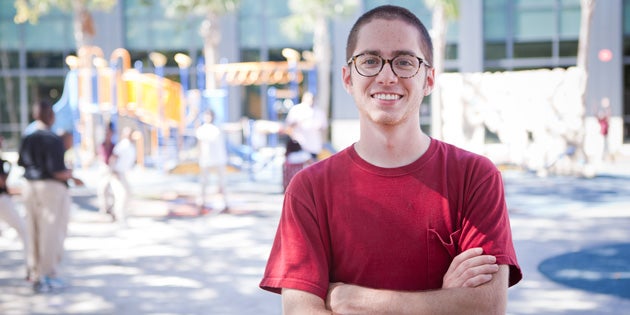College of Charleston Honors College student Clay Dustin has made it his mission to put the fun back in playground recess.
 Dustin, a double major in mathematics and data science, created Project Playground to promote physical activity among school children during recess and to give teachers a much-deserved break. Project Playground puts volunteers in every recess period at a downtown Charleston elementary school. The volunteers, all College of Charleston students, organize games and activities for the children.
Dustin, a double major in mathematics and data science, created Project Playground to promote physical activity among school children during recess and to give teachers a much-deserved break. Project Playground puts volunteers in every recess period at a downtown Charleston elementary school. The volunteers, all College of Charleston students, organize games and activities for the children.
Too often, Dustin says, schools cut recess short to make time for instruction and other activities. In some cases, recess may be taken away from children if they misbehave. During what little time is set aside for recess – typically 20 minutes – it can be difficult for supervising teachers to get anything else done if they are constantly breaking up playground arguments.
“I’m a firm believer in fun,” Dustin says. “If you can occupy kids with a game of tag, you can distract them from things that might get them in trouble.”
Dustin, a junior who graduated from Summerville High School, has always enjoyed working with children. He spent the summer following his freshman year working in an AmeriCorps program that partnered with local schools in Pittsburgh.
 He enjoyed the interactions with the children so much that the following year he volunteered to be a reading mentor at Memminger Elementary School in Charleston. While spending time at the school he noticed that many children were not participating in recess. Some of the teachers told Dustin that they deal with a lot of behavior problems during recess. The teachers also told him they typically do not participate in structured games with the children during recess because they use that time to catch up on other tasks.
He enjoyed the interactions with the children so much that the following year he volunteered to be a reading mentor at Memminger Elementary School in Charleston. While spending time at the school he noticed that many children were not participating in recess. Some of the teachers told Dustin that they deal with a lot of behavior problems during recess. The teachers also told him they typically do not participate in structured games with the children during recess because they use that time to catch up on other tasks.
Dustin had an idea: What if he could gather students from the College to volunteer to play with the Memminger students during recess? Not only would it provide some game-oriented guidance for the children and cut down on mischief, but it also would provide a short break for the teachers assigned to supervise recess.
In late 2013, after receiving positive responses from the school’s teachers and principal, Dustin formed Project Playground as part of an Honors College program called Honors Engaged that gets Honors College students involved in service projects in the Charleston community. He established the program as an official College club and currently serves as president.
RELATED: See other examples of how the Boundless campaign supports distinctive academic programs.
Anne Gutshall, an assistant professor in the College’s Department of Teacher Education and faculty advisor to the Project Playground club, incorporated the volunteer experience into an assignment for students in her Human Growth and Development class.
For Gutshall’s students, many of whom plan to become teachers, the volunteer experience reinforced the importance of recess and physical activity for children.
“Despite empirical data that suggests that children benefit physically, emotionally, socially and academically from recess breaks in the school day, many schools have been decreasing the time allocated for recess in favor of increasing time spent on instruction,” Gutshall says.
 Dustin also recruited volunteers from the Honors College and other areas of the College.
Dustin also recruited volunteers from the Honors College and other areas of the College.
To streamline the process of getting its volunteer students into Memminger, Project Playground partnered with the nonprofit organization Communities in Schools, which works closely with the Charleston area school districts.
Project Playground officially launched in spring 2014 and Dustin had about 30 students from the College volunteering for one-hour slots one day per week. They play and engage with the children through variety of activities ranging from tag and jump rope for the older kids to hide-and-seek and sidewalk chalk for the younger children.
Dustin says the volunteers try to keep the structure of play very flexible and to encourage the children to use their imaginations. “I love the creative aspects,” he says. “As adults, we often misunderstand the actions of children. More often than not, kids just want to be good.”
By the time the program concluded for winter break recently, its volunteer roster had grown to about 50 students from the College. Although Dustin plans to step down as president of the club in order to concentrate on his studies, he intends to continue volunteering with the program. After all, he wants to stay involved in the fun.




